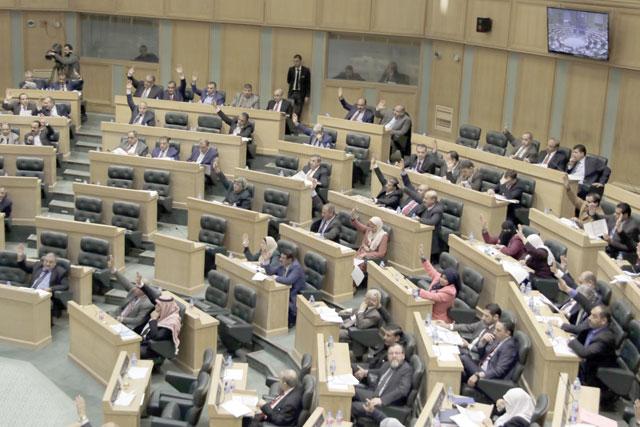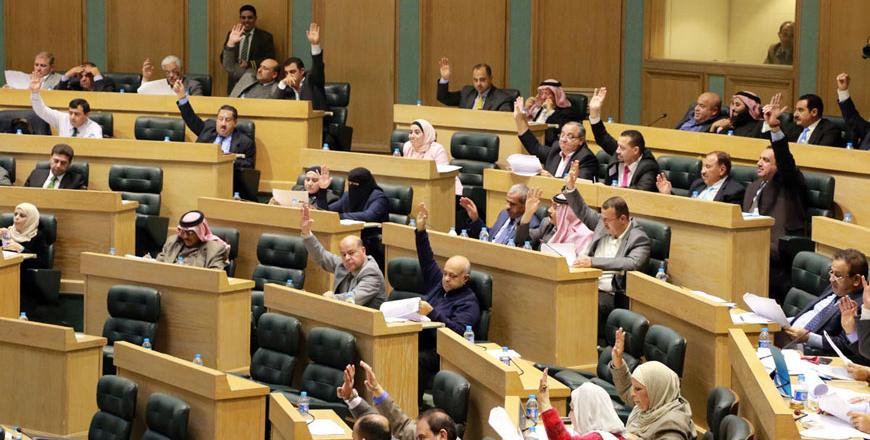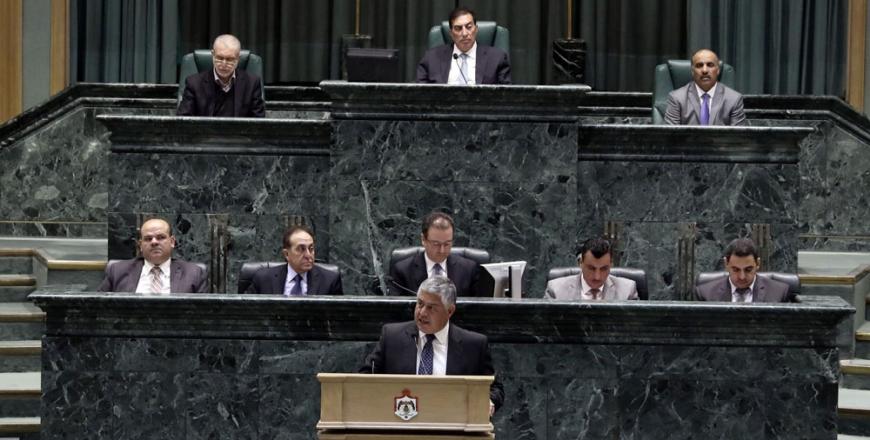You are here
Lower House endorses draft law for 2017 state budget
By Jassar Al Tahat - Jan 20,2017 - Last updated at Jan 20,2017

Lawmakers vote to endorse the draft state budget law for 2017 during a Lower House session on Thursday (Photo by Osama Aqarbeh)
AMMAN — The Lower House on Thursday endorsed the 2017 draft laws for the state budget and the budgets of independent government units, after the government replied to MPs’ suggestions on the bills.
The government has said that the budget deficit this year is expected to narrow to JD827 million, which amounts to 2.8 per cent of the gross domestic product (GDP), after receiving foreign grants.
Before the grants, the deficit is expected to go down to 5.5 per cent of the GDP, compared with 7.2 per cent in 2016.
As for expectations related to the budgets of independent government units, the government said total revenues for government units is estimated to reach around JD1.666 billion this year, compared with the JD1.710 billion re-estimated in 2016.
In Thursday’s session, Finance Minister Omar Malhas said in the government’s response to deputies that “the Cabinet will take into consideration, and study the possibility of implementing, the suggestions of MPs”.
Malhas said the government will study the possibility of levying a JD1 monthly fee for each mobile phone line, as well as making better use of rented and owned government buildings and dispensing with unused facilities.
Deputies also suggested unifying work permit fees for foreign workers and requiring owners of cars with foreign licence plates to pay customs duties and sales tax after a certain period in the Kingdom.
The minister stated that the Civil Service Retirement Law will be amended to ensure better financial support to retired state employees.
“The government has finished a study looking into raising the minimum wage, the results of which will be announced soon. The government has also formed a committee to study senior officials’ wages in the civil sector,” Malhas said.
The minimum wage currently stands at JD190.
Referring to past policies which caused “sales tax distortions”, Malhas said “the government will take measures to fix the taxation policy, taking into consideration low-income citizens”.
The minister said the government expects to receive JD777 million worth of foreign grants in 2017, with JD392 million grant from the Gulf Cooperation Council and JD385 million from other donor countries.
“The government is in agreement with the [House] Finance Committee regarding the efficiency of spending,” Malhas said.
The minister added that the government has designed a “comprehensive programme” to raise awareness about support available for small- and medium-sized projects.
“In order to ensure funding sources for small- and medium-sized projects, the government has secured $440 million in soft loans, which have so far benefited more than 11,000 projects, more than 60 per cent of which are outside Amman,” added Malhas.
He said that implementing the cuts suggested by the House Finance Committee will have a severe effect on health and education services.
“Cutting back JD33.8 million from the running costs of governmental entities, as well as independent ones, will affect the activity of important ministries,” the minister continued.
The ministries of health and education are two of the key ministries which would be affected by the proposed cuts, he added.
After the 130-strong House endorsed the draft laws, Prime Minister Hani Mulki thanked the lawmakers for their cooperation and reiterated the government’s commitment to addressing the points raised by MPs.
In remarks to Jordan Television later on Thursday, Lower House Speaker Atef Tarawneh said the Chamber worked to ensure that basic commodities are “left untouched”, adding that consumers will not be affected by price hikes.
Instead of approving JD450 million in additional taxes, Tarawneh said, lawmakers suggested alternatives to protect people with middle and lower incomes.
The bills will now be referred to the Senate for discussion and endorsement, after which they will be ratified by His Majesty King Abdullah and published in the Official Gazette.
2016 economy highlights
- State budget deficit reached JD856 million in 2016
- National debt stood at JD26.1 billion, making up 94.9% of GDP
- Central bank’s foreign currency reserves stood at $12.9 billion by yearend
- GDP growth in first three quarters was 2%
- Exports dropped by 9.6% in first 10 months
- Imports dropped by 7.1% in same period
- Trade volume deficit dropped by 8.6% in first 11 months
Source: Minister of Finance Omar Malhas’ speech
Related Articles
AMMAN — The Lower House on Thursday passed the draft 2016 state budget law in addition to the budget bill of independent government institut
AMMAN — The Lower House on Wednesday listened to the state budget draft law speech delivered by Finance Minister Omar Malhas, the Jordan New
AMMAN – The government on Sunday submitted to the Lower House the draft 2016 general budget law in addition to the bill governing the budget













